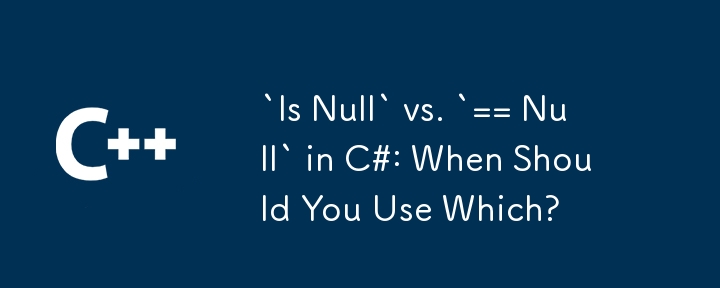Home >Backend Development >C++ >`Is Null` vs. `== Null` in C#: When Should You Use Which?
`Is Null` vs. `== Null` in C#: When Should You Use Which?
- Mary-Kate OlsenOriginal
- 2024-12-31 14:20:12221browse

Differences Between "x is null" and "x == null": A Detailed Analysis
In C# 7, the introduction of the "is null" operator sparked questions about its advantages over the traditional "x == null". This article delves into the intricacies of both operators, exploring their nuances and providing guidance on their optimal usage.
Functionality
While both operators evaluate to true when the variable "x" is null, they exhibit different behaviors when "x" is a constant other than null. "Is null" considers the type on the right side of the comparison, while "x == null" does not. For instance, if "x" is an integer and the comparison is made with 1, "x is 1" evaluates to false and "x == 1" evaluates to true.
Performance
Under the hood, "is null" invokes System.Object::Equals(object, object), while "x == null" invokes ceq. The choice of operator has performance implications when overloaded equality operators are involved. "Is null" performs a null check followed by a call to the overloaded operator, while "x == null" directly invokes the overloaded operator.
Syntax
The syntax of "x is null" is more compact and concise than "x == null". In cases where null comparison occurs frequently, "x is null" can improve code readability and reduce verbosity.
Usage Guidelines
The choice between "x is null" and "x == null" depends on the context. When dealing with non-null constants, "x is null" should be used to consider the type and produce accurate results. For simple null comparisons, "x == null" remains an efficient and familiar option.
In summary, "x is null" introduces type-checking into null comparisons, which can be advantageous in certain scenarios. However, the performance trade-offs with overloaded equality operators should be considered. Both operators serve their respective purposes, and the appropriate choice depends on the specific requirements of the code.
The above is the detailed content of `Is Null` vs. `== Null` in C#: When Should You Use Which?. For more information, please follow other related articles on the PHP Chinese website!
Related articles
See more- C++ compilation error: A header file is referenced multiple times, how to solve it?
- C++ compilation error: wrong function parameters, how to fix it?
- C++ error: The constructor must be declared in the public area, how to deal with it?
- Process management and thread synchronization in C++
- How to deal with data splitting problems in C++ development

